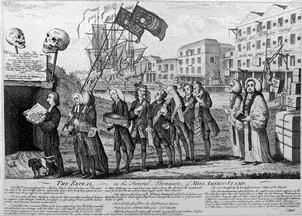Date Enacted-The Townshend Acts were enacted in June 1767 and were repealed in March 1770. (A. Brinkley, 2004)
Purpose of the Policy-The Townshend Acts were passed for economical reasons. These acts were designed to collect revenue from the colonist. ("Townshend Acts" "n.d")
Provisions-The Townshend Acts imposed duties on glass, lead, paper, paints and tea. ("Townshend Acts" "n.d")
Who was most affected-Although the Townshend Acts affected everyone in America the merchants were affected most. This is because the merchants had to buy items in order to sell them to make a living. The taxes on glass, lead, paper, paints, and tea, which were all sold by merchants, affected how the merchants priced the items. Because they had to be sold at a higher price in order to make profit, there were fewer buyers and traders. ("Townshend Acts" "n.d") The clergy were affected because they used paper for many things such as letters and church related things. Farmers were not affected much because they had little need for the materials that were taxed.
How the Colonist Responded-The colonist were very unhappy and thought that they were being treated unfairly. The colonist, who were urged by the writtings of Samuel Adams and John Dickinson, protested against the acts and the merchants boycotted English goods. ("Townshend Acts" "n.d") The Massachusetts House of Representatives began a campaign against these acts by sending a petition to King George of England asking for the repeal of the Townshend Revenue Act. ("Townshend Acts" "n.d") In Feburary 1768 Samuel Adams drew up a circular letter asking the other colonial assemblys to join the resistence movement and to oppose the taxes. ("Townshend Acts" "n.d"). The British then dissolved the Massachusetts House of Representatives and asked the other houses to stop, but they did not listen and were dissloved. ("Townshend Acts" "n.d")
The Contribution to Tensions between the Colonist and the English-These acts and the problems they created made tensions much worse between the colonist and English. British troops, which were already stationed in New York in 1768, were sent to Boston in order to protect the customs office. This action eventually lead to the Boston masscure in March 1770. ("Townshend Acts" "n.d") The colonist then decided to not use British goods, which affected British trade. ("Townshend Acts" "n.d") These acts made the colonist and English closer to war. Every act was just one step closer to trouble and only made tensions between them worse.
Bibliography
-
"Townshend Acts." Of 1767 ***. N.p., n.d. Web. 30 Oct. 2015.
-
"Townshend Acts | Great Britain [1767]." Encyclopedia Britannica Online. Encyclopedia Britannica, n.d. Web. 30 Oct. 2015.
-
"Townshend Acts." History.com. A&E Television Networks, n.d. Web. 30 Oct. 2015.
-
Infoplease. Infoplease, n.d. Web. 30 Oct. 2015.
-
Brinkley, Alan. The Unfinished Nation: A Concise History of the American People. Boston: McGraw-Hill, 2004. Print.
-
"13 Colonies Map - Free Large Images." Free Large Images. N.p., 26 Nov. 2014. Web. 30 Oct. 2015.
-
Bio.com. A&E Networks Television, n.d. Web. 30 Oct. 2015.
-
"Townshend Acts." Townshend Acts. N.p., n.d. Web. 30 Oct. 2015.


Protest oo the Townshend Acts
"Townshend Acts." Townshend Acts. N.p., n.d. Web. 30 Oct. 2015.
Samuel Adams Map of the American Colonies
Bio.com. A&E Networks Television, n.d. Web. 30 Oct. 2015. "13 Colonies Map - Free Large Images." Free Large Images. N.p., 26 Nov. 2014. Web. 30 Oct. 2015.
